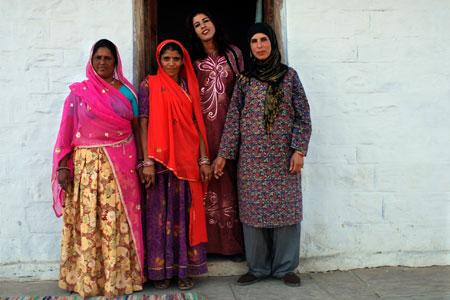Rafea, who lives in a poor Bedouin village in Jordan, gets an offer to go to India and learn how to install solar panels. This could help raise the standard of living in villages all over Jordan. For Rafea it's a unique opportunity, but it also has major consequences for her family. She is the mother of four children, and her husband does not approve of her decision.
Rafea's story is dramatic but also extremely inspiring to women in the West - and even more so to women in the Arab World.
An Eye on America
"Solar Mamas", which follows Rafea's struggle to make a difference in the world, is co-directed by Jehane Noujaim and Mona Eldaief, and for producer Mette Heide of Plus Pictures there's huge potential in developing films and composing crews across continents.
The two co-directors, Noujaim and Eldaief, come with a raft of advantages. They grew up in the US and were trained by top documentary filmmakers. And because they are half-Egyptian and speak Arabic, they can communicate easier with Rafea and the other people in the film.
The film follows other women, too, from Kenya, Columbia and Burkina Faso. At those locations, the crew was expanded with handpicked field directors. One was Andreas Koefoed, also from Denmark, who joined the shoot in India. The film's editor, Jean Tsien, is Chinese and was picked because she has experience with editing international productions and a knack for telling human-interest stories, Heide says.
Heide is drawing on the network she has built up from her many productions. As a producer, she has kept an eye on America.
"I produce with talent from both the Danish and American scenes. The US is exciting from a producer's point of view, because Americans are conscious about the market in a way that's interesting to incorporate in documentary film production. Moreover, there is something about the American storytelling structure, and it's more interesting to speak to many millions of viewers instead of a few hundred thousand."
Avoiding stereotypes
Most of the photography for "Solar Mamas" is in the can. Rafea, the Bedouin woman, left for India and quickly proved herself to be one of the smartest students at the school. But midway through the course, she got a call from Jordan. Her husband was threatening to divorce her and take the children away. Shortly, she went back to her village in Jordan.
"When you produce international projects, it's important to give them broad appeal. Rafea's story is dramatic but also extremely inspiring to women in the West – and even more so to women in the Arab world."
Rafea went home, but she rebelled. Despite her husband's protests, she made up her mind to go back to India and finish her training. The film follows that whole turn of events.
"We need engaging and entertaining documentaries that give us other views of the world. Documentaries can do that. We can penetrate into unknown areas and relate real-life drama in a nuanced way. In this film, we want to avoid the stereotypes and show a reality we didn't know before. And we want to do this by telling a story with a strong main character and powerful dramaturgy," Heide says.
An extended theatrical feature, in addition to the TV documentary, will be ready in early 2012. The TV version is going out on 25 November 2012, along with the seven other documentaries under the project.

